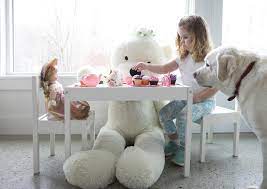S. Szuman presented an interesting theory of play “play is a specific, natural, innate and specific form of a child’s activity and a special method thanks to which the child enriches his experience and acquires information about the surrounding world.”
W. Dyner believes that “play brings children closer to the world of adults, enables them to get to know it and experience it through a fictitious participation in it.” (…) “While playing, the child acquires a demonstrative science about the world and about human life.”
“It grows in relations between people of a given environment, shapes its own moral attitudes and improves its own standards of behavior towards peers and adults.” “According to him, play is also a diagnostic value, because it reveals the child’s attitude towards other people, tells about his desired and undesirable behaviors.”
Properly selected games may help a child overcome difficulties and conflicts
The definition of play was also formulated by W. Okoń. He took into account the imagination and creativity that helps the child learn about the surrounding reality, open it and transform it: “… play is an activity performed for one’s own pleasure based on the participation of imagination creating a new reality.”
In contemporary psychology, K. Tyborowaska mentioned four basic aspects of play:
- play is a social phenomenon, not a biological one – it develops under the influence of the child’s environment and activities;
- it is different from animal play;
- it has a historical character, that is, it changes under the influence of social conditions in which children are brought up;
Reflects her cognition of reality
Bogdan Suchodolski notices that the world of fiction that accompanies play helps a person in life, it makes life more joyful: “play, being a certain form of unreal reality, is a source of reorganization and the construction of forces.”
 Many definitions and views on play recognize the fact how important and essential it is in a child’s life. Through play, the child grows up faster and easier, the norms of social behavior are brought closer to him, and the child gets to know himself, people and the world around him more easily and in a more interesting way.
Many definitions and views on play recognize the fact how important and essential it is in a child’s life. Through play, the child grows up faster and easier, the norms of social behavior are brought closer to him, and the child gets to know himself, people and the world around him more easily and in a more interesting way.
In the literature, we can find many theories of play that emphasize its various properties and biological and social sources, and show its functions and goals in the life of an individual in various ways.
One of the oldest play theories is the theory of excess forces, or excess energy, formulated by the famous poet and philosopher F. Schiller. She held the view that animals and humans ventilate excess life forces in play, which they would not use in everyday life to meet their immediate biological needs. In children, this excess energy is discharged while playing.

